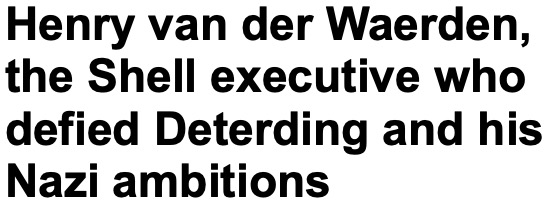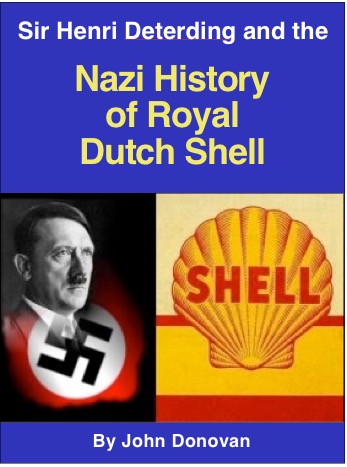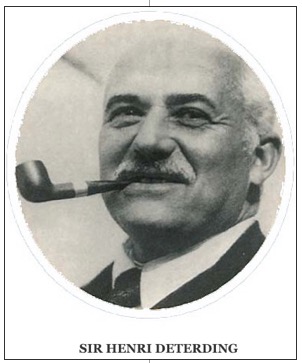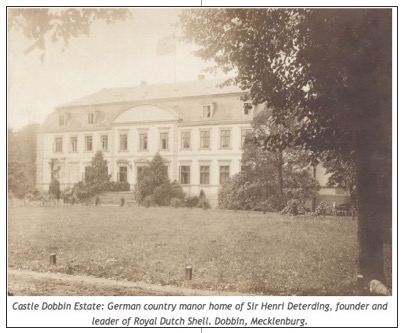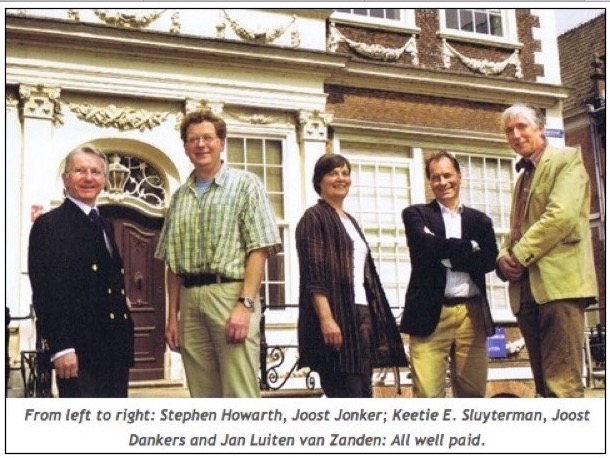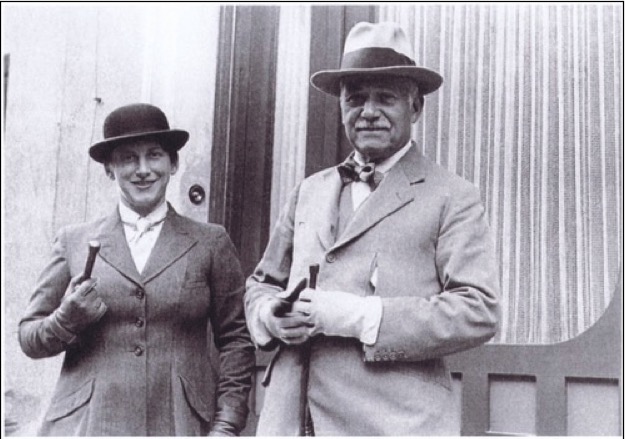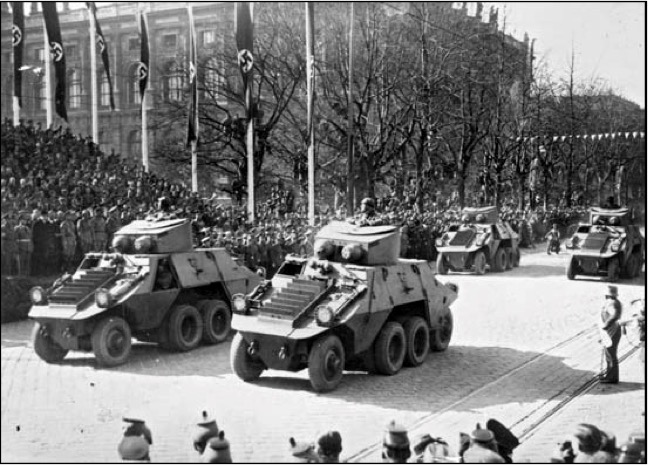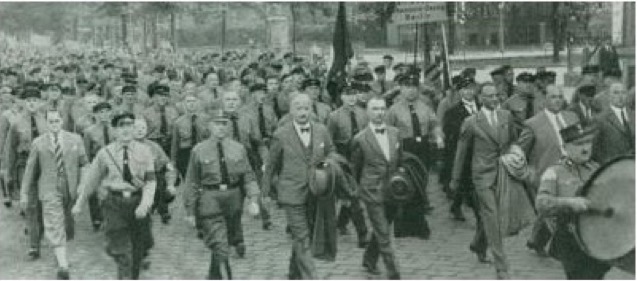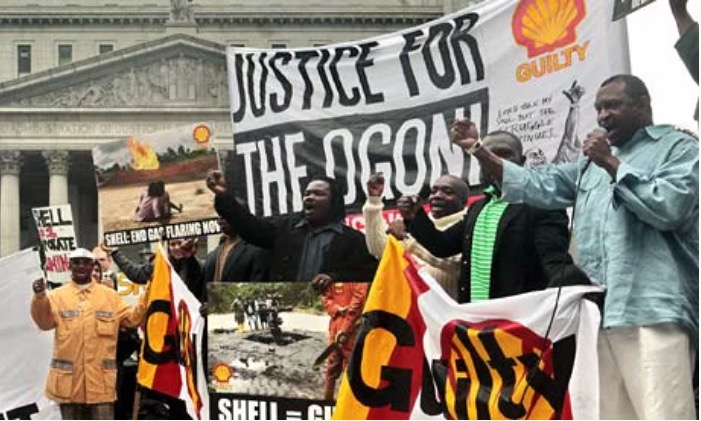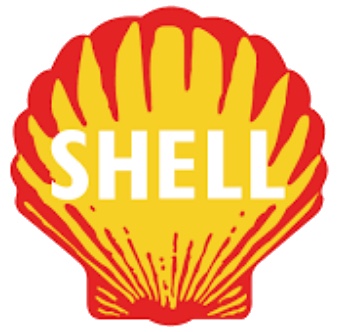Meta
DISCLAIMER
This is not a Shell website. You Can Be Sure Shell does not endorse or approve of this site, or its content. Royal Dutch Shell Plc threatened to take legal action in the event of publication. All bluster and bluff thus far. There are no subscription charges nor do we solicit or accept donations. It is a non-commercial entirely free to use website drawing attention to Shell’s toxic Nazi history. The Shell logo image with the white text used on this website, as per the above example, is in the public domain because its copyright has expired and its author is anonymous. It can be found on WIKIMEDIA COMMONS. Link to Shell’s own website: shell.com
ROYAL DUTCH SHELL FOUNDER SIR HENRI DETERDING, NAZI FINANCIER
SEARCH FACILITY
NAZI HISTORY OF ROYAL DUTCH SHELL
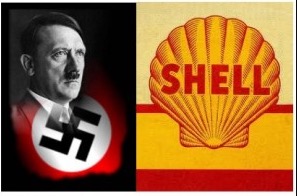
Royal Dutch Shell conspired directly with Hitler, financed the Nazi Party, was anti-Semitic and sold out its own Dutch Jewish employees to the Nazis. Shell had a close relationship with the Nazis during and after the reign of Sir Henri Deterding, an ardent Nazi, and the founder and decades-long leader of the Royal Dutch Shell Group. His burial ceremony, which had all the trappings of a state funeral, was held at his private estate in Mecklenburg, Germany. The spectacle (photographs below) included a funeral procession led by a horse-drawn funeral hearse with senior Nazis officials and senior Royal Dutch Shell directors in attendance, Nazi salutes at the graveside, swastika banners on display and wreaths and personal tributes from Adolf Hitler and Reichsmarschall, Hermann Goring. Deterding was an honoured associate and supporter of Hitler and a personal friend of Goring.
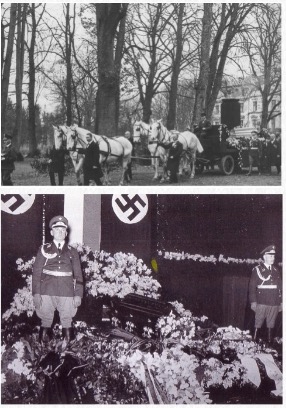
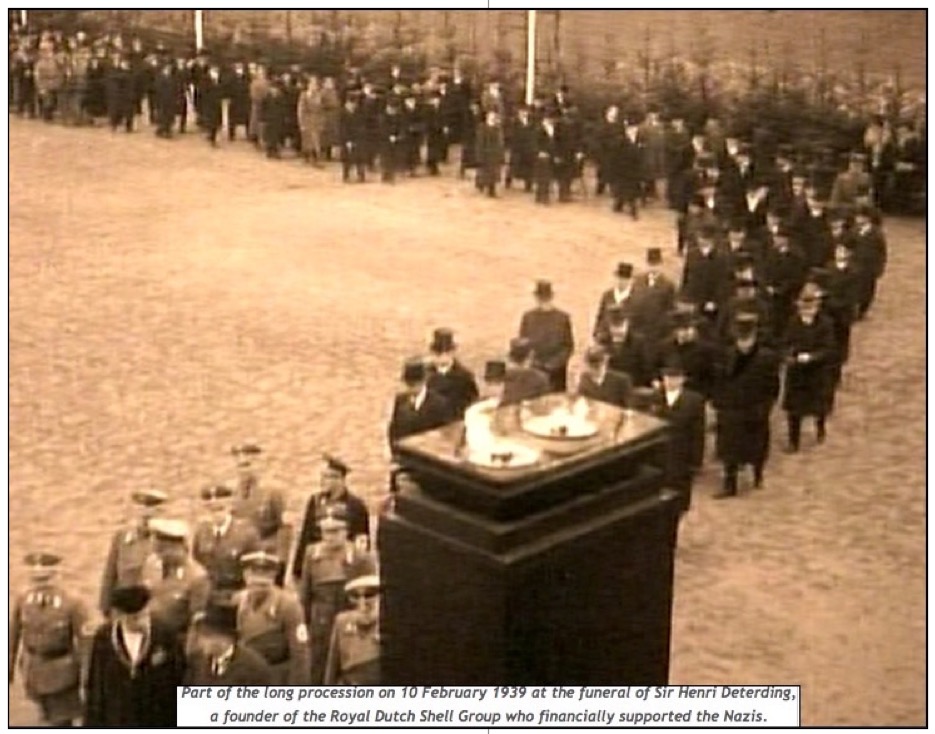
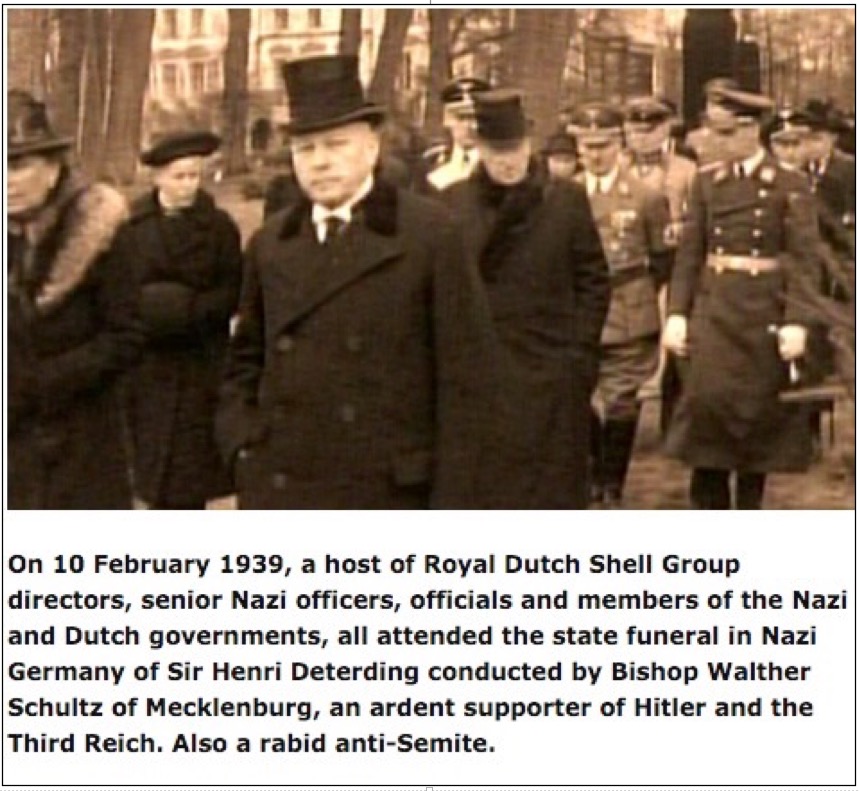
Deterding was the guest of Hitler during a four-day summit meeting at Berchtesgaden. Sir Henri and Hitler both had ambitions on Russian oil fields. Only an honoured personal guest would be rewarded with a private four-day meeting at Hitler’s mountain top retreat.
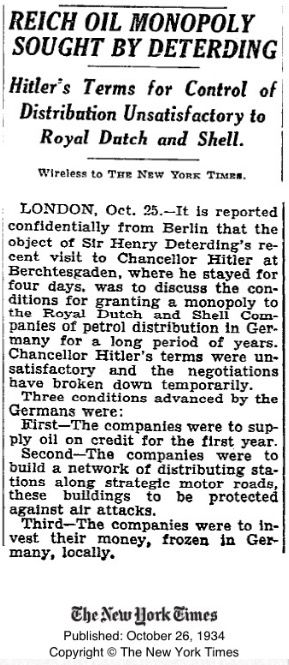
MORE INFORMATION
Shell appeased and collaborated with the Nazis. The oil giant instructed its employees in the Netherlands to complete a form giving particulars about their descent, which for some, amounted to a self-declared death warrant. Shell used slave labour and was a close business partner in Germany of I.G. Farben, the notorious Nazi run chemical giant that also used slave labour and supplied the Zyklon-B gas used during the Holocaust to exterminate millions of people, including children. Shell continued the partnership with the Nazis in the years after the retirement of Sir Henri and even after his death. It was money generated on Shell forecourts around the world, profiteering from cartel oil prices, that funded the Nazi party and saved it from financial collapse. Evidence about Shell’s Nazi connections can be found in extracts from “A History of Royal Dutch Shell” Volumes 1 and 2 authored by historians paid by Shell, who had unrestricted access to Shell archives. There are 67 pages in total, so takes some time to download.
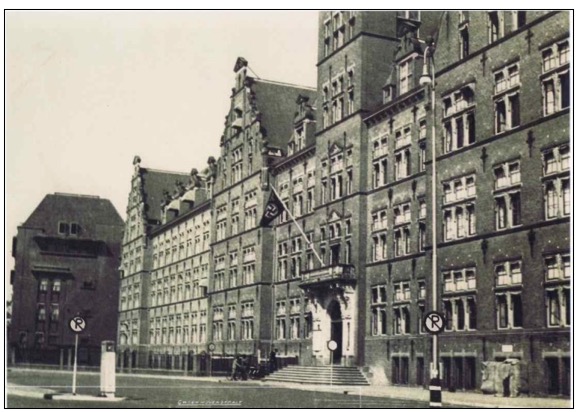
Photograph (full size here) shows a Swastika flag flying at the head office of Royal Dutch Petroleum, 30 Carel van Bylandtlaan, The Hague, during the Nazi occupation of the in World War II (From Image Database Hague Municipal)

Sir Henri Deterding (photograph above and oil painting below), the founder of the Royal Dutch Shell Group – known as “The Most Powerful Man in the World” – who became an ardent Nazi and financial supporter of Hitler and the Nazi party on behalf of his beloved company, Shell.
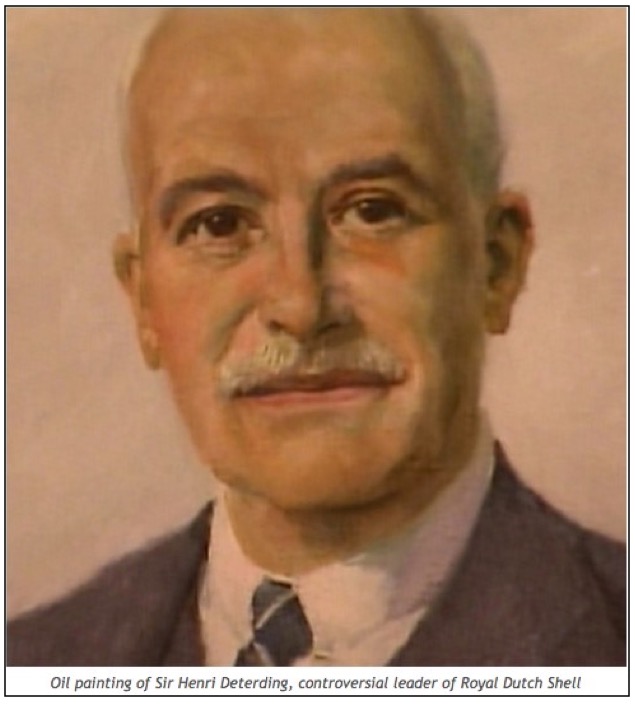 The caption says: “Oil painting of Sir Henri Deterding, controversial leader of Royal Dutch Shell”.
The caption says: “Oil painting of Sir Henri Deterding, controversial leader of Royal Dutch Shell”.NAZI GERMANY NEWS NOW
HITLER & THE THIRD REICH
- German airline Lufthansa acknowledges it was ‘clearly’ part of the Nazi system February 4, 2026 5:59 pm El País The German airline Lufthansa acknowledged this week its responsibility during National Socialism and has commissioned an exhaustive scientific study on the role it played during that period, especially regarding the exploitation of forced laborers. Until …
- The Woman Who Refused to Give Flowers to Hitler February 4, 2026 7:58 am Aish Yocheved Gold, who recently died at the age of 102, lived a life that tracked the arc of modern Jewish history, its deepest horrors and its defiant triumphs. As a teenager in Nazi Germany, she came face to face with Adolf Hitler and refused to honor him. …
- AfD Lawmaker Gets Found Guilty of Money Laundering, Coercion in Germany February 3, 2026 1:35 am MENAFN (MENAFN) A court in southern Germany on Monday found far-right politician Daniel Halemba guilty of money laundering and coercion, highlighting ongoing legal controversies surrounding the Alternative for Germany (AfD) party, according to reports. Halemba, a …
- Inside Hitler’s drug addiction as Nazi doc fed him a cocktail of animal hormones and opiates & left him begging for meth February 1, 2026 11:24 am The U.S. Sun IN “super junkie” Adolf Hitler’s final days, his addiction to cocaine, heroin and meth came to a head – leaving him combing the streets for a fix. As the Second World War neared its end, the Fuhrer’s supply of addictive stimulants and opioids ran dry. Sign …
- Neo-Nazi who threatened to turn Muslims into “mincemeat” jailed for making explosives in garden January 30, 2026 4:44 am Islam Channel Harry Whittaker, a neo-Nazi who fantasised about turning Muslims into “mincemeat” and called for Tommy Robinson to lead a civil war, has been jailed for three years and nine months. The unemployed heroin user manufactured explosives in the garden shed of …
- Hitler′s paperchase January 30, 2026 3:01 am Qantara.de In the spring of 1934, Fritz Grobba, Germany′s ambassador to Iraq, reported that an Iraqi newspaper has begun to print extracts from Hitler′s Mein Kampf in Arabic. In his letter to the foreign office in Berlin, the diplomat advocated turning the translated …
- Neo-Nazi behind 1970 Munich arson that killed Holocaust survivors, report finds January 29, 2026 6:35 pm Ynet Fifty-six years after seven Holocaust survivors were killed in an arson attack on a Jewish nursing home in Munich, Der Spiegel reported Thursday that a neo-Nazi with an extensive criminal record was most likely responsible. According to the report, the …
- Tunisian school textbooks praise Hitler while ignoring the Holocaust, researchers find January 29, 2026 2:21 pm All Israel News A banner showing Hitler at a high school in Jendouba, Tunisia, 2015. (Photo: Social media) Schoolbooks in Tunisia praise Nazi leader Adolf Hitler and largely ignore the Holocaust, according to a new research report published earlier this week by the …
- Local opinion: Let us not repeat the tragedy of Germany under Hitler January 29, 2026 1:38 pm The Arizona Daily Star The following is the opinion and analysis of the writer: Albrecht Classen During the late 1920s and early 1930s, a former soldier rose in rank, gaining popularity, appealing to the masses, speaking a nationalist language of extreme effect, radicalizing the …
- From the archives: Brownsville resident recalls horrors experienced as a Nazi prisoner January 29, 2026 10:18 am Brownsville Herald - Texas Only have a minute? Listen instead George Halfy is seen in this undated photo that appeared in The Brownsville Herald’s Jan. 28, 1973 edition. (The Brownsville Herald archives) “I don’t think the world will allow another Hitler.” This was 41-year-old …
-
Privacy & Cookies: This site uses cookies. By continuing to use this website, you agree to their use.
To find out more, including how to control cookies, see here: Cookie Policy Archives
Categories
- A History of Royal Dutch Shell
- Adolf Hitler
- Alaska
- Alfred Donovan
- Alfred Rosenberg
- Allseas
- Anti-Semitic
- Apartheid
- Appeasement
- Arctic
- Austria
- Bataafsche
- Ben van Beurden
- Berchtesgaden
- Berlin
- Bill Campbell
- Bing Crosby
- BP
- Business Ethics
- Business Principles
- Castle Dobbin
- Charlotte-Minna Knaack
- Collaboration
- Corrib Gas Project
- Corruption
- Czechoslovakia
- Deutsche Gasolin A.G.
- Donald G. Lane
- Dr George Bell
- Dr. Erich Boeder
- Dr. John Huong
- Ed Vulliamy
- Environment
- Eva Braun
- Exxon
- Fascists
- Field Marshal Wilhelm Keitel
- Fritz De Kok
- Gazprom
- General Alfred Jodl
- Germany
- Gestapo
- Groningen Earthquakes
- Hakluyt & Company
- Hauptmann Eckhardt von Klass
- Heinrich Himmler
- Hermann Göring
- Holocaust
- Human Rights
- I.G. Farben
- IG Farben
- Iran
- Iraq
- Jewish
- John Donovan
- John Donovan Ebook
- Joost Jonker
- Kelling Hall
- Luiten van Zanden
- Mecklenburg
- Mein Kampf
- Michiel Brandjes
- Mussolini
- NAM
- Nazi Winter Help Organisation
- Niger Delta
- Nigeria
- Nuremberg War Crimes Trials
- Ogoni
- Oil
- Oleg Mitvol
- Peter Voser
- Pieter Schelte
- Pieter Schelte Heerema
- President Putin
- Prince Bernhard
- Queen Beatrix of the Netherlands
- Queen Wilhelmina
- Reichsmarks
- Rhenania-Ossag
- Robert Finn
- Rominten Hunting Lodge
- Royal Dutch Petroleum Company
- Royal Dutch Shell
- Royal Dutch Shell Group
- royaldutchshellplc.com
- Russia
- Shell
- Shell Oil
- Shell Reserves Fraud
- Shell Spying
- Sir Henri Deterding
- Sir Henri Deterding and the Nazi History Royal Dutch Shell
- Sir Henri Deterding Funeral
- Sir Mark Moody-Stuart
- Sir Philip Watts
- Slave labor
- Standard Oil
- Stephen Howarth
- Swastika flag
- The Angriff Nazi newspaper
- The Holocaust
- The Nazi Party
- The Nazis
- The Netherlands
- The Reichstag fire
- Uncategorized
- Verwalter
- Volkischer Beobachter
- Waffen-SS
- Walter C. Teagel
- Wikipedia
- Winterhilfswerk
- World War 2
- Yes Men
- YOU CAN BE SURE OF SHELL
- Zyklon-B gas
OVER 500 EXTERNAL PUBLICATIONS CITING OUR SHELL WEBSITES
See our link list of over 500 articles by the FT, Wall Street Journal, Reuters, Bloomberg, Forbes, Dow Jones Newswires, New York Times, CNBC etc, plus UK House of Commons Select Committee Hansard records, information on U.S. Securities & Exchange Commission website etc. all containing references to our Shell focussed websites, or our website founders Alfred and John Donovan. Includes TV documentary features in English and German, newspaper and magazine articles, radio interviews, newsletters etc. Plus academic papers, Stratfor intelligence reports and UK, U.S. and Australian state/parliamentary publications, also citing our Shell websites. Click on this link to see the entire list, all in date order with a link to an index of over 100 books also containing references to our websites and/or our activities.

John Donovan, the website owner
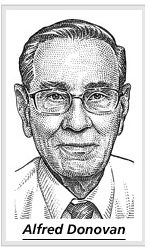
A head-cut image of Alfred Donovan (now deceased) appears courtesy of The Wall Street Journal.
Category Archives: World War 2
Royal Air Force Attack on Gestapo HQ in Shell House Copenhagen
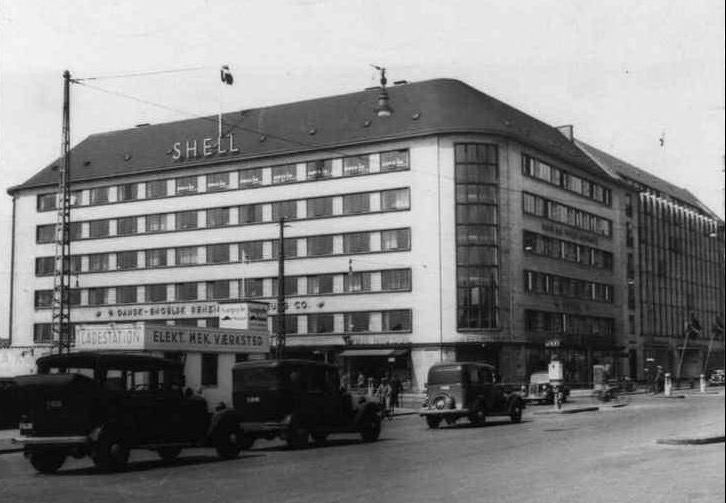 Shell House before the bombing. At the time of the bombing, it was painted in camouflage colours
Shell House before the bombing. At the time of the bombing, it was painted in camouflage colours
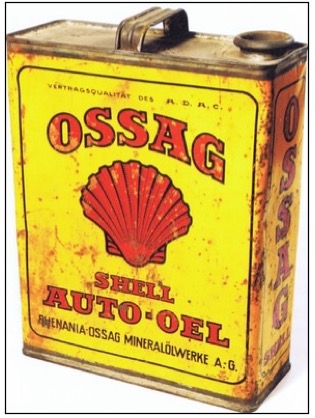 Operation Carthage, on 21 March 1945, was a British air raid on Copenhagen, Denmark during the Second World War which caused significant collateral damage. The target of the raid was the Shellhus, used as Gestapo headquarters in the city centre. It was used for the storage of dossiers and the torture of Danish citizens during interrogations. The Danish Resistance had long asked the British to conduct a raid against the site. The building was destroyed, 18 prisoners were freed and anti-resistance Nazi activities were disrupted.
Operation Carthage, on 21 March 1945, was a British air raid on Copenhagen, Denmark during the Second World War which caused significant collateral damage. The target of the raid was the Shellhus, used as Gestapo headquarters in the city centre. It was used for the storage of dossiers and the torture of Danish citizens during interrogations. The Danish Resistance had long asked the British to conduct a raid against the site. The building was destroyed, 18 prisoners were freed and anti-resistance Nazi activities were disrupted.
SUMMARY OF FEATURED CONTENT FROM THE EBOOK “SIR HENRI DETERDING AND THE NAZI HISTORY OF ROYAL DUTCH SHELL”
- In the years leading up to WW2, the Dutch founder of the Royal Dutch Shell Group, Sir Henri Deterding became an ardent Nazi. He financially backed the Third Reich and met directly with Hitler on behalf of Royal Dutch Shell.
- As a major financial contributor to Nazi Germany in pre-WW2 years, the Royal Dutch Shell Group, under Dutch leadership, arguably had some indirect responsibility for the death toll in the subsequent war, in which over 50 million people perished.
- Shell publicly boasted at the time about the importance of its financial contribution to the German economy. The claims were made by Shell in Germany while the country was under Nazi control.
- In years leading up to WW2, Shell conspired with partners, Standard Oil, and German chemical giant I.G. Farben, to covertly import oil products, including airplane fuel, from the US into Nazi Germany. The US government was kept in the dark.
- I.G. Farben supplied the Zyklon-B gas used in the Holocaust to kill millions of people.
- The portrayal in 2007 by Shell’s paid historians of a distant relationship between Deterding and Hitler, in which all attempts by Deterding to meet with Hitler were rebuffed is simply untrue.
- In fact, their meetings included a four-day one-on-one summit held at Hitler’s mountain retreat, as reported by Reuters in 1934.
- Deterding has been described by independent authors as “a hardline Nazi revered and ultimately mourned by Hitler.” That description is confirmed by the evidence within this book and evidence accessible via links.
- There are credible allegations that the Royal Dutch Shell Group, under the control of Dutch directors, used forced labor at its German subsidiary, Rhenania-Ossag. Many of its directors and staff were fanatical Nazis.
- Royal Dutch Shell collaborated in the annexation and occupation of sovereign countries by the Nazis – Austria and Czechoslovakia – before the outbreak of WW2.
- The donations and financial contributions to the Third Reich were all carried out under the control of Dutch directors of companies within the Royal Dutch Shell Group.
- In 1936, while still a director of multiple Royal Dutch Shell group companies, Sir Henri purchased the Castle Dobbin estate North of Berlin for 1,050,000 Reich marks from Queen Wilhelmina of the Netherlands.
- Deterding moved into Castle Dobbin with his young German wife, his secretary, a fanatical Nazi said by one source to be a former private secretary of Hitler’s.
- Sir Henri’s friend Hermann Göring, the founder of the Gestapo, regularly visited Castle Dobbin to go hunting with him. Deterding generously gave Göring the Rominten Hunting Lodge in East Prussia as a spectacular gift. Kaiser Wilhelm II once owned it.
- In 1936 and 1937, Sir Henri – while still a director of multiple companies within the Royal Dutch Shell Group, in which he held a controlling interest – made huge donations of food (“millions of tonnes”) to Nazi Germany as part of the “Winter Help” scheme. A New York Times report in June 1937 (“Deterding to Distribute More Food in Germany”) specifically linked the food donations to Germany’s rearmament policy.
- The massive donations enabled significant funds to be diverted at a time when the Nazi regime was engaged in urgent rearmament of its military might.
- Seven thousand railway wagons were used in the first immense delivery.
- Deterding died just before the outbreak of WW2. He was honored by a Nazi ceremonial funeral at Castle Dobbin in February 1939. It was attended by a full contingent of Royal Dutch Shell Group directors mingling with Nazi military officers.
- A glowing tribute to Sir Henri on behalf of the German nation was inscribed on a wreath sent by Adolf Hitler.
- The Bishop who conducted the funeral service was a supporter of Hitler and a rabid anti-Semite.
- Film footage of the Nazi funeral spectacular exists.
- Fears that the Nazis intended to exploit the death of Sir Henri, just before the start of WW2, to seize control of the Royal Dutch Shell Group, were well founded. The UK National Archives has kindly given permission for related documents and correspondence to be featured within this book.
- Dutch directors of the Royal Dutch Shell Group engaged in anti-Semitic policies against Shell employees and were also guilty of collaboration and appeasement.
- Royal Dutch Shell employees in the Netherlands were instructed to complete a form that for some amounted to a self-declared death warrant. Many did not survive the war.
- The Nazis did succeed in gaining control over Dobbin Castle.
- In the latter part of WW2, Field Marshal Wilhelm Keitel, SS leader Heinrich Himmler and General Alfred Jodl, Chief of the Operations Staff of the Armed Forces High Command, were all stationed at Dobbin Castle.
- Hitler’s final despairing message from his Berlin bunker, a day before he committed suicide, was sent to Field Marshal Keitel at Dobbin Castle, whilst it was still owned by the Deterding family. Strangely, that somehow seems appropriate.
- Evidence was on display at Castle Dobbin, signed by Hitler, confirming Deterding’s financial support for the Nazis. Also a personal testimony by Herman Göring acknowledging the generosity of his friend and benefactor, Sir Henri Deterding.
- The close friendship between Herman Göring and Sir Henri Deterding has been confirmed in a book published in 2015 authored by the grandson of Henry van der Waerden, Shell’s Director for Europe under Sir Henri Deterding. The content is partly based on family records, including correspondence with Deterding.
- Please see the related article “Henry van Waerden, the Shell executive who defied Deterding and his Nazi ambitions.”
- Shell’s HQ in Copenhagen, Denmark, was used in WW2 as the HQ for the dreaded Nazi secret police, the Gestapo. “Shellhus” was bombed and destroyed by the RAF on 21 March 1945. It had been used for the torture of Danish citizens.
- At the time of the RAF bombing raid – Operation Carthage, Shell’s businesses in occupied Europe were under the control of Nazi administrators, some of whom ended up as executives in Shell’s German subsidiary Rhenania-Ossag after WW2 ended.
DETERDING’S PALATIAL UK RESIDENCES
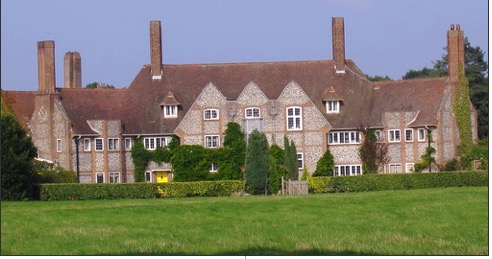 Kelling Hall, in Holt, Norfolk, shown above, was one of Deterding’s palatial UK residences. It is located near the Sandringham estate of the British royal family. Built for Sir Henri in 1913, in grounds of 1,600 acres, the property was sold in 2008 by his grandson James Deterding for £25 million (over $37 million USD).
Kelling Hall, in Holt, Norfolk, shown above, was one of Deterding’s palatial UK residences. It is located near the Sandringham estate of the British royal family. Built for Sir Henri in 1913, in grounds of 1,600 acres, the property was sold in 2008 by his grandson James Deterding for £25 million (over $37 million USD).
Deterding at various times owned a Dutch estate in Wassenaar near the Hague, a grand country home in Buckhurst Park in Winkfield, near Ascot in Berkshire, a fashionable apartment in Park Lane, London, and a villa at St. Moritz in Switzerland.
CHAPTER 1: The best historians Shell could buy
By John Donovan
Shell commissioned a group of eminent “independent” historians (above) mostly Dutch, to author a history of Royal Dutch Shell to mark the Group’s centenary in 2007. The introduction in Volume 1 pledged independent research and “a proper and even-handed assessment of Deterding.” Something went amiss because the “history,” as published in regard to his dealings with Hitler, is simply untrue.
On 24 May 2015, a light-hearted story in the Prufrock column of The Sunday Times posed the question: “ARE corporate histories the new harbingers of doom?” It cited the release of corporate histories of two multinational banks that proved embarrassing to the banks due to unforeseen developments.
CHAPTER 6: Great friend of the Germans
This chapter deals with the role of Royal Dutch Shell as a contributor to the economy of Nazi Germany and financier of the Third Reich via its long-time Director General, Sir Henri Deterding. The funding was of a scale that led to Hitler paying homage to him as a great friend of the Germans. Sir Henri actively supported the rearmament of Nazi Germany. He was a generous friend that the Nazis tried to exploit even after his death.
Any major company in existence for over 100 years is bound to have some skeletons in the closet. In the case of Royal Dutch Shell, it arguably includes indirect responsibility for millions of deaths.
CHAPTER 10: Shell support for the Nazis continued after the retirement of Sir Henri as leader
The above photograph is of Sir Henri Deterding around the time of his retirement as absolute leader of the Royal Dutch Shell Group, standing alongside his third wife, a thirty-eight-year-old German-born ardent Nazi, Charlotte Knaack. Her admiration for the Nazis probably strengthened his views, and no doubt played a part in the decision to move their home to Germany.
In October 1936, the first news reports of the pending resignation of Sir Henri Deterding as the leader of Royal Dutch Shell Group were published.
CHAPTER 11: Shell collaborated in the Nazi annexation of Austria and occupation of Czechoslovakia
German forces entered Vienna on 17 March 1938 (above). The Nazis annexed Austria in what became known as the Anschluss and occupied Czechoslovakia a year later. Royal Dutch Shell authorized its German subsidiary Rhenania-Ossag, to take over Shell operating companies in both countries.
Being one of the two biggest German oil concerns and the main lube oil manufacturer, Shell subsidiary Rhenania-Ossag was an industry leader in Nazi Germany. Many of its directors and staff were Nazis.
Following Hitler’s annexation of Austria on 12 March 1938 (photo) and the Nazi occupation of Czechoslovakia in March 1939, Dutch directors of Royal Dutch gave approval to Rhenania-Ossag taking over the Shell operating companies in those countries.
CHAPTER 12: Shell’s notorious business partner: IG Farben
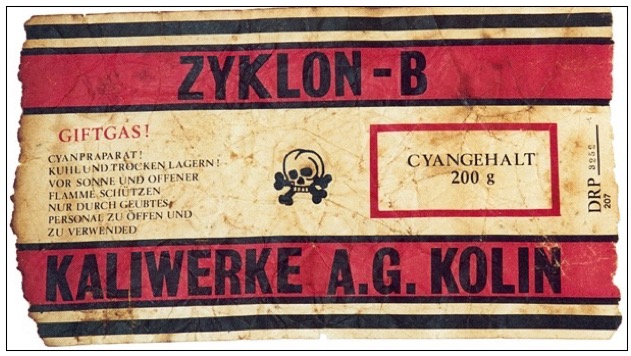
Several IG Farben directors were found guilty of war crimes arising from their actions during WW2. The firm manufactured large quantities of Zyklon-B gas used by the Nazis to kill millions of Jews at extermination camps during the Holocaust. Royal Dutch Shell was a business partner of I.G. Farben both in Germany and globally.
Prior to WW2, Royal Dutch Shell had been a business partner both internationally and in Germany, with I.G. Farben (Interessen-Gemeinschaft Farbenindustrie AG.
IG Farben was formed in 1925 from a number of chemical companies and became the largest chemical company in the world. Involved in war crimes during WW2, the company was seized by the Allies in 1945 and liquidated in 1952.
CHAPTER 13: Royal Dutch Shell and Nazi slave labor
The photograph shows military uniforms worn by marching employees of the Shell German subsidiary, Rhenania-Ossag. A photograph on the next page shows swastika flags on display during a staff meeting. Rhenania-Ossag was part and parcel of the Nazi movement when the Shell Group was in undisputed full control of the company. A senior director was involved in Nazi military planning.
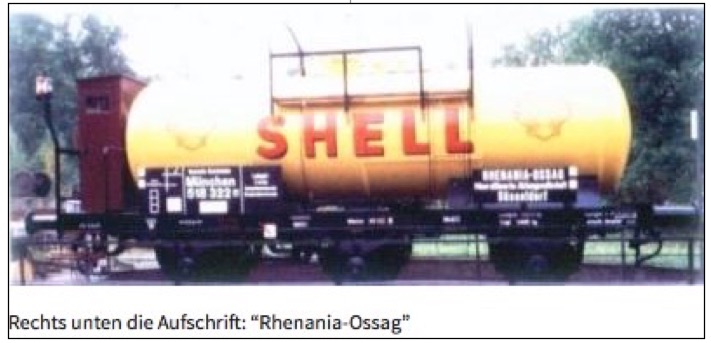
In 1935, Rhenania-Ossag (owned by Royal Dutch Shell) was Germany’s second-largest gas station company, with 16,363 petrol pumps and several refineries. There were active Nazi members in the workforce and management. It’s DG, Dr. Erich Boeder, was involved in Nazi military planning (oil production) on behalf of the company.
